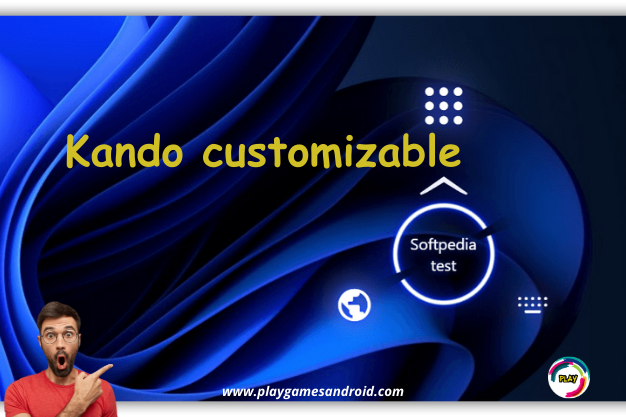Have you ever wanted a faster, more organized way to access your most-used files, applications, or websites? Enter Kando, a free software solution designed to revolutionize desktop navigation. By integrating a dynamic, visually appealing “pizza-style” menu, Kando allows you to streamline your workflow and maximize productivity. Let’s explore its features and benefits while discovering why Kando is a must-have tool for anyone looking to improve desktop efficiency.
What is Kando?
Kando is a lightweight, free desktop application that introduces a radial menu system to your workspace. This unique menu design, reminiscent of a pizza, enables intuitive and lightning-fast navigation to your favorite tools and files.
After installing Kando, you’ll notice a small icon in your system tray. This unobtrusive feature ensures that the software remains non-intrusive, appearing only when you need it. Pressing the default shortcut (Ctrl + Space) unveils the menu, giving you an instant glimpse of its capabilities.
Key Navigation Modes in Kando
Point-and-Click Mode
The Point-and-Click Mode offers simplicity. As the name implies, you can select items by pointing and clicking. What makes it special is that you don’t need to click precisely—anywhere in the item’s direction works. This enhances speed and reduces the effort required for precise movements.
Marking Mode
Marking Mode introduces a more interactive experience. By dragging an item out of the central “pizza” menu, you can access submenus. Simply release the mouse button to open your desired selection.
Turbo Mode
For keyboard enthusiasts, Turbo Mode takes navigation up a notch. Hold down the “Ctrl” key to browse through submenus. Release the key to open the highlighted item, ensuring a seamless experience without additional clicks.
Customizing Your Kando Menu
One of Kando’s standout features is its customization capabilities. You can tailor menus to fit your workflow, ensuring quick access to the items you use most.
Accessing the Menu Editor
To start customizing, open the Menu Editor by clicking the gear icon at the bottom right of the Kando menu. Alternatively, right-click the Kando tray icon and select “Show Settings.”
Creating and Editing Menus
You can modify the default menu or design one from scratch. The drag-and-drop interface allows you to:
- Add files, applications, or website shortcuts.
- Reorder menu items for optimal organization.
- Edit item properties via the right-hand panel.
Submenus for Better Organization
Avoid clutter by creating submenus. As a rule of thumb, limit menus to 8-12 items for easier navigation. Thanks to Kando’s deep hierarchical structure, submenus are intuitive to use and keep everything neatly organized.
Advanced Features of Kando
Support for Multiple Menus
Kando allows users to define unique hotkeys for different menus. For example, you can create a menu for work-related tools and another for personal use, toggling between them effortlessly.
Diverse Item Types
Menus can include various elements such as:
- File and folder shortcuts.
- Website links.
- Text snippets.
- Commands and macros.
- Keyboard shortcuts and more.
Theming and Customization
Choose from multiple themes to personalize the look and feel of your menu. This not only enhances usability but also adds a touch of aesthetic flair to your desktop.
Conditional Triggers
Advanced users can configure conditions for when menus appear, enabling a context-sensitive experience that adapts to your workflow.
Why Choose Kando?
Kando is ideal for individuals who want to:
- Save time navigating their desktop.
- Keep frequently accessed items within reach.
- Customize their workspace for efficiency and aesthetics.
However, it’s worth noting that Kando is designed primarily for mouse users. If you rely heavily on the keyboard for navigation, this software might not be the best fit for your needs.
FAQs
What operating systems does Kando support?
Kando is compatible with major desktop platforms, including Windows.
Can I use Kando without a mouse?
While Kando offers keyboard shortcuts, its core features are optimized for mouse users.
Is Kando free?
Yes, Kando is completely free to download and use.
How many items can I include in a menu?
It’s recommended to limit menus to 8-12 items for better usability. Submenus can help organize additional items.
Does Kando offer a portable version?
Currently, Kando requires installation but has minimal system requirements.
Can I backup my custom menus?
Yes, Kando allows users to export and import menu configurations, ensuring your settings are safe.
Conclusion
Kando offers an innovative and highly customizable way to enhance your desktop experience. Its intuitive design, combined with powerful features, makes it a standout tool for anyone seeking faster navigation and improved productivity. Whether for work or personal use, Kando is a game-changer in menu customization.
- Discover The Best PPSSPP ROMs And Games For PC
- Plants vs Zombies Mod 29.4 PC Game for TikTok Live in 2025
- Earn More with TikTok Live & StreamToEarn Tools in 2025










Facebook comments